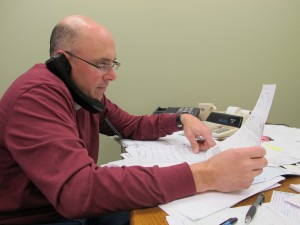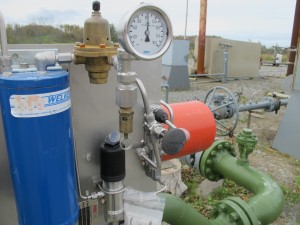Royalty disputes fuel anger over state’s oversight of gas production data
-
Marie Cusick

Marie Cusick/ StateImpact Pennsylvania
Businessman and landowner Dave DeCristo at his office in Canton. He frequently calls gas companies with questions and complaints about his royalty statements.
The Marcellus Shale is one of the most productive natural gas formations in the world. But when it comes to measuring precisely how productive it is, Pennsylvania doesn’t audit the numbers.
Natural gas production data is submitted to the state Department of Environmental Protection directly from drillers and published online before it’s verified.
As allegations of underpaid gas royalties continue, some landowners are frustrated there is nowhere for them to go to check how much gas is produced and what they’re supposed to be paid.
“Confusion every month”
At gasoline stations throughout Pennsylvania, the pumps are checked by the state’s Bureau of Rides and Measurement Standards. A small sticker shows the Department of Agriculture has certified the pump, so motorists know they’re getting the gallons they’re buying.
But natural gas is different. It’s measured in cubic feet and goes to heat homes and produce electricity.
When it comes to verifying exactly how many cubic feet is being pumped out of Pennsylvania, natural gas gets nowhere near the level of government oversight that gasoline pumps do.
It’s become a problem for people like Bradford County businessman Dave DeCristo.
He’s the first to admit he’s benefited greatly from the Marcellus Shale industry by selling supplies to companies to fuel fracking operations. In a 2011 article about shale gas DeCristo told Time Magazine, “I’ve been a blessed person because of this.”
But these days, he’s not at all pleased with his royalty statements. He owns about 1,200 acres, which are leased to half a dozen drilling companies.
“These are the most important meters in the state,” he says. “They’re not being monitored, checked, sealed, verified, anything– it’s pathetic.”
At his office near Canton, DeCristo’s desk is littered with royalty statements. He’s been a businessman for more than two decades and says neither he nor his accountant can make sense of the numbers.
He often gets statements from multiple companies who have joint ventures in the same gas well.
Even when he’s looking at the same well, during the same month, different gas companies send him statements showing different production numbers and prices the gas sold for at the time.
This can happen because companies may market the gas at different prices. Companies may also be allocated different amounts of gas from the same well, but there is no government agency where DeCristo can go to check the totals. On a recent statement, he says he believes gas company Mitsui calculated his share of royalties incorrectly.
“Confusion every month,” he complains. “Things are just not right.”
He tries calling Mitsui. No one answers, so he leaves a voicemail. Then, he tries to get a hold of Chesapeake Energy.
No one picks up there either. A recording says the company is experiencing high call volumes. He tries another company– Anadarko Petroleum. He gets another recording.
Finally a man from Anadarko’s landowner relations division picks up and tells DeCristo that sometimes Chesapeake Energy—which is the main operator of the well– gives them production data with errors in it. He tells DeCristo all the companies could be off, if Chesapeake makes a mistake.
DeCristo asks if that’s a common occurrence with Chesapeake. The Anadarko employee wouldn’t say.
“You can’t verify what is produced”
Chris Jones is a Towanda attorney who represents landowners. He testified at a state Senate hearing on royalties in June.
“You can’t verify what is produced in a month and how you’re to decipher your statements as to what you’re being paid,” he told the senate panel.
Marcellus Shale natural gas production data is submitted by companies to the state Department of Environmental Protection twice a year and published online before it’s checked.
DEP spokeswoman Amanda Witman says there are five staff members who look over the information, but she would not say it’s audited.
“I would use the word ‘examined’,” she says.

Marie Cusick / StateImpact Pennsylvania
Gas metering equipment at a producing well in Susquehanna County.
In an online disclaimer, the DEP denies any liability for errors. The message was posted last year after Chesapeake Energy submitted such error-ridden data that the DEP’s computer system rejected it.
Since Chesapeake is Pennsylvania’s largest operator, the problem threw off gas production totals for the entire state.
Witman could not say how often the DEP uncovers errors, but says it’s not common.
“It is very rare for an operator to report incorrect production volumes.”
Patrick Henderson is a deputy secretary for Governor Corbett, who focuses on energy issues. He thinks the DEP’s disclaimer is important.
“Particularly at the Wall Street level and in the media,” says Henderson. “Before conclusions are drawn on day one, we ought to take a step back and understand the context in which the information was delivered. Sometimes there may be human error. This year, I believe there was a decimal point that was a significant factor.”
But those production numbers are now being scrutinized by other landowners in Bradford County, where Chesapeake Energy has most of its leases. The company has been the focus of many royalty payment allegations and lawsuits.
“A level of distrust”
Bradford County Commissioner Daryl Miller (R) says he constantly hears questions from constituents about their royalty statements.
“There seems to be a level of distrust,” says Miller. “You only have to be off a small fraction of a percentage [and] you’re talking about a lot of gas and a lot of money.”
The royalties problem extends beyond individual landowners– to all Pennsylvanians.
The state Department of Conservation and Natural Resources (DCNR) manages gas drilling on public forest lands and receives royalties from about 500,000 acres.
DCNR does not rely on the gas production data from DEP.
Instead, the agency requires companies to submit gas production information on a payment statement, which is then independently audited by Penn State University.
But according to internal e-mails obtained by StateImpact Pennsylvania through the state’s Right to Know Law, DCNR has still had to haggle with companies for tens of thousands of dollars in underpaid royalties.
In an emailed statement, department spokeswoman Chris Novak says the royalties problems are relatively uncommon.
“We will soon be hiring an accountant in the Bureau of Forestry to work on these issues because of the higher volume of work related to Marcellus Shale activity.”
At the federal level, the Energy Information Administration (the statistics arm of the Department of Energy) tracks natural gas production data.
EIA analyst Sam Gorgen says Pennsylvania’s reporting requirements make his job more difficult.
“It’s a lot harder to process and analyze,” he says. “Pennsylvania only reports Marcellus [gas data] twice a year, compared to other states like North Dakota and Texas which collect data on a monthly basis.”
Gorgen doesn’t question the validity of the information he gets from states, but he thinks more frequent reporting would be useful.
“Lots of stakeholders would benefit from having monthly data,” he says.
Among the top natural gas producing states, Texas, Louisiana, Oklahoma, Colorado and Wyoming all require monthly production reports.
“A numbers game”
Back at his desk piled high with paperwork, DeCristo says he often finds small errors, which tend to favor the gas companies.
“It would obviously look like fraud if most of the mistakes are in their favor,” he says.
“If they’re going to play with numbers and shortchange people what else is it? They can call it mistakes all they want. But it ain’t mistakes. If you’re employees make this many mistakes with numbers, they shouldn’t be working for you, because this is a numbers game.”
Several state legislators have recently introduced bills to strengthen regulations around reporting gas production numbers and royalty payments. Meanwhile DeCristo’s getting ready to sue two of the companies he has leases with.
None of the gas companies mentioned in this story returned calls seeking comment.
Click here or here to read DCNR’s letters citing underpaid royalties. According to the agency, these disputes have been resolved:
Below are Dave DeCristo’s royalty statements from three companies showing the same gas well during the same time period.

















